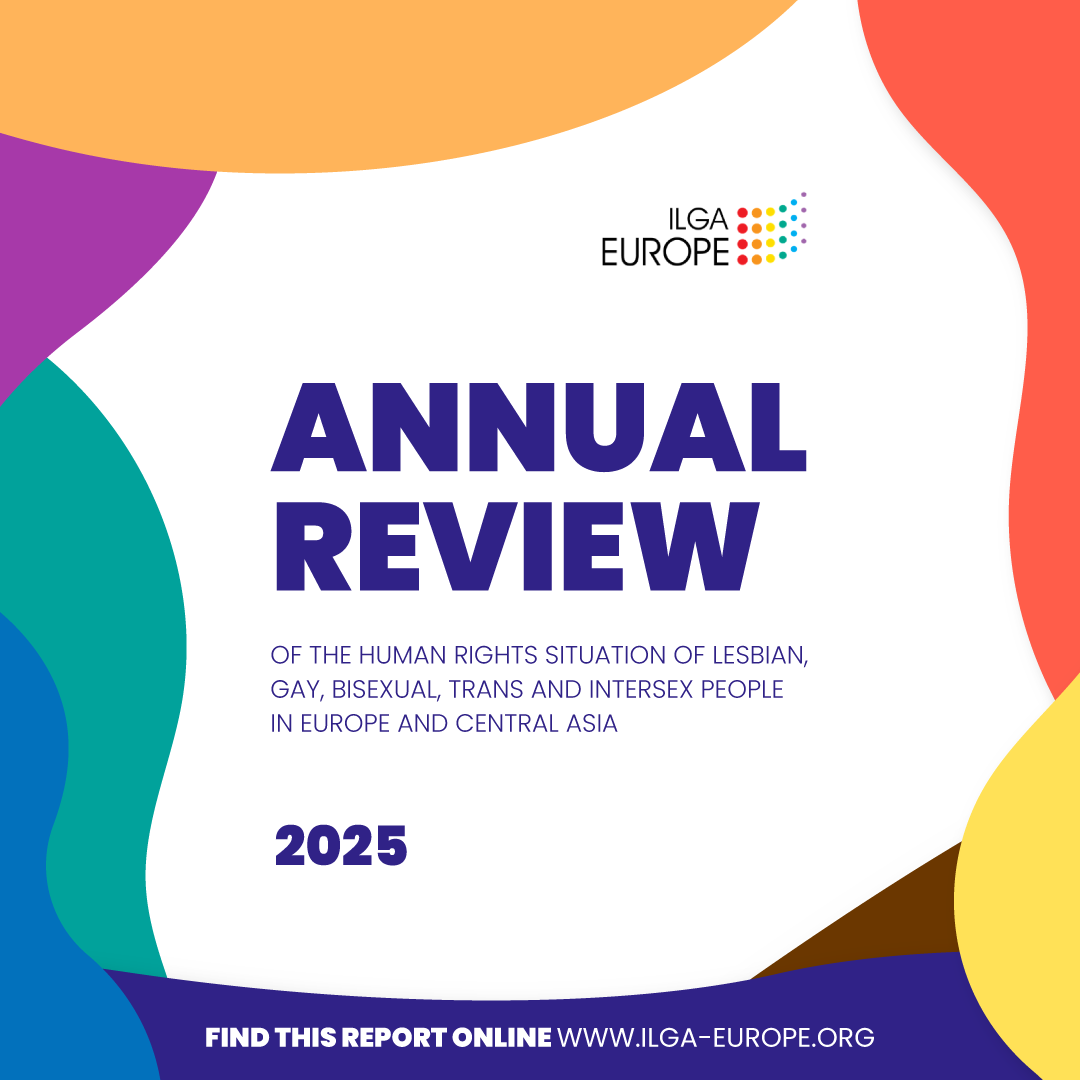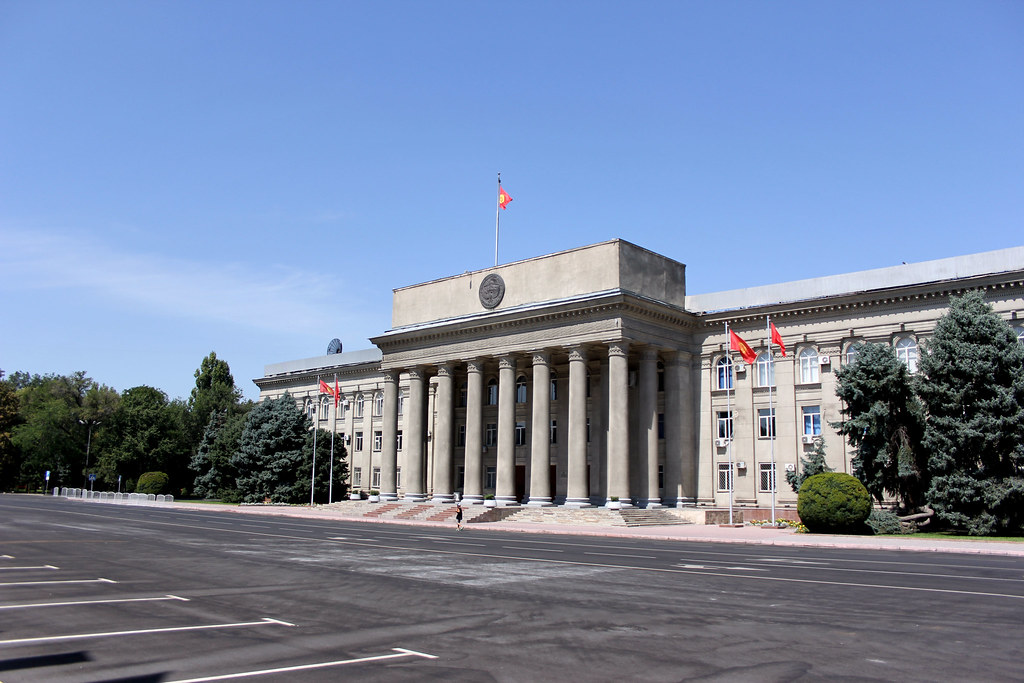New Era of Coordinated Attacks on Foundations of Fundamental Rights, European Report Finds

A major report published today identifies how LGBTI people are being weaponized to erode the foundations of freedom and democracy across Europe.
Released today, February 18, 2025, ILGA-Europe’s ‘Annual Review of the Human Right Situation of LGBTI People in Europe and Central Asia’ warns of a new era in which rising anti-LGBTI legislation threatens fundamental rights. Governments are fueling anti-LGBTI sentiment to push laws that restrict freedom of expression, association, and fair elections.
Governments are increasingly adopting tactics similar to Russia’s, forcing NGOs to register as ‘foreign funded’ to undermine their legitimacy, restrict funding, and stifle human rights activism. Known as ‘foreign agent’ laws, these measures are framed as protecting families and traditional values while often specifically targeting LGBTI NGOs. Last year in Bulgaria, Georgia, Hungary, Kyrgyzstan, and Montenegro, proposed foreign agent laws posed a direct threat to civil society.
Such legislation is enacted with or in the wake of so-called ‘LGBT propaganda’ laws that seek to criminalise visibility of LGBTI people, ban content, silence activists and restrict freedom of assembly, which have been either discussed, proposed or adopted in seven countries (Azerbaijan, Belarus, Bulgaria, Georgia, Kazakhstan, Romania, and Slovakia). These laws have been increasingly leveraged in education sectors, restricting or entirely preventing the inclusion of LGBTI issues in curricula and awareness-raising initiatives. In addition, attempts to introduce legislation excluding LGBTI topics from sex education were recorded in Bulgaria, Hungary, Italy, the Netherlands, Luxembourg, Norway, Romania, Russia and Slovakia.
In this context, LGBTI-phobic hate speech, sexism and misogyny are increasingly normalised, often fuelled by public figures, including political and religious leaders and state institutions. This is in turn driving an unprecedented surge in violence as hate crimes have reached record levels across the region.
The normalisation of hate is also providing justification for the blocking of healthcare for trans people. Andorra, Georgia, Hungary, Ireland, Moldova, Romania, Russia, and the UK have all put in place new barriers to care. Following the UK Cass Review, efforts to restrict trans healthcare for minors have emerged in Austria, France, Italy, Ireland, Poland, and the UK, putting trans lives further at risk.
As an increasing number of governments crack down, LGBTI people are being forced to flee—but Europe is closing its doors. Russia, Kyrgyzstan, and Turkey are intensifying persecution, and Turkmenistan is entrapping and torturing LGBTI individuals. Yet, many European countries, including Austria, Belgium, Bulgaria, Ireland and the UK, are denying asylum claims based on outdated, arbitrary assessments, with some officials rejecting applicants for not ‘seeming LGBTI enough.’
According to ILGA-Europe’s Executive Director, Chaber: “This report confirms what many of us have feared—we are entering a new era where LGBTI people have become the testing ground for laws that erode democracy itself. Across Europe and Central Asia, governments are using anti-LGBTI rhetoric to justify restrictions on free speech, civil society, and fair elections. What begins as an attack on LGBTI rights rapidly grows into a wider assault on the rights and freedoms of all individuals in society. This is not just an LGBTI issue; it is a crisis for human rights and democracy as a whole.”
ILGA-Europe’s Advocacy Director, Katrin Hugendubel added: “While governments are increasingly scapegoating LGBTI people to push restrictive laws, the courts both in the EU and across Europe are in turn upholding LGBTI human rights, with key judgements on procedures for LGBTI asylum seekers, anti-LGBTI hate speech, freedom of association and expression, legal gender recognition, and sexual and reproductive rights. But at this critical time, our leaders cannot simply leave the protection of human rights to the courts. Politicians at both the European and national levels must act decisively to counter the growing attacks on the cornerstones of democracy we are seeing. The normalisation of anti-LGBTI rhetoric is not just a threat to one community—it is now a proven direct assault on the democratic principles that underpin our societies.”
Further Information
Download a full analysis of the trends here
Read the ILGA-Europe’s Annual Review here
See up-to-date legislative developments in each country with ILGA-Europe’s Rainbow Map
Statement: Kyrgyzstan targets LGBTI communities in a new law

ILGA-Europe expresses solidarity and stands with LGBTI organisations and communities in Kyrgyzstan as the country’s President signed into law a discriminatory provision banning dissemination of information about LGBTI people, rights, and identities among minors.
We firmly assert that this specific provision in the new legislation does not protect anybody; instead, it deprives LGBTI children from access to services and support that they need to thrive and puts them at risk of harassment, violence and a generally hostile environment. The damaging effects of similar Russian legislation on the lives of children, as well as on the lived realities of LGBTI people in general, are well-documented.
Information about LGBTI people and identities is listed in the new law on a par with violent or pornographic content, and the adoption and discussion of this law unfolded in parallel with smear campaigns against LGBTI organisations, activists, and communities in Kyrgyzstan. This confirms that the new law is a deliberate attempt to stigmatise LGBTI people and to fuse LGBTI people and identities with abuse of children and exposing children to harm.
Finally, just like previously in Russia, Poland and Hungary, this legislation comes along with other anti-democratic developments, such as the draft law on media and the attempts to outlaw foreign funding, and is a precursor of other attempts to limit the space of independent civil society and media. It sounds an alarm for the entire civil society in Kyrgyzstan and its partner and ally organisations and demands a united front across different parts of the country’s civil society as well as international supporters, funders, and allies.
Together with our members and partners, ILGA-Europe will continue to advocate for the rights of LGBTI people in Kyrgyzstan and will be rallying support and solidarity for LGBTI organisations and their allies in the country.
Now that LGBTI organisations in Kyrgyzstan need to take their time to assess the situation and plan ahead, we encourage all supporters and allies to not rush to action but follow the lead of the LGBTI organisations in the country. It is also a moment for all of us to consider where our positions and resources could be most helpful, immediately and in the long term. Be it documenting the effects of the law on the rights and freedoms of LGBTI people and their allies, advocating for its repeal, offering security support, building solidarity across the civil society, or otherwise supporting different communities to counter the gaps and risks created by this law.
Background
On 15 August, Kyrgyzstan enacted a new law that aims to restrict freedom of expression and access to information about LGBTI people, identities, rights, and lives.
Formally, the law seeks to ban dissemination of harmful information among minors, while labelling as harmful also information that “denounces family and traditional societal values, promotes non-traditional sexual relations and initiates disrespect towards parents or other family members.” This language echoes the ‘anti-propaganda’ laws that are in place in Russia and Hungary.
The law comes into force on 30 August, 15 days after its publication.
The official title of the law is “On introducing amendments to several legal acts of the Kyrgyz Republic”, and it amends the Code of Misdemeanors, the law “On measures to prevent harm to children’s health, physical, intellectual, mental, spiritual and moral development in the Kyrgyz Republic”, and the law “On Mass Media”.
Dissemination of “harmful information” will lead to fines of up to 5,000 soms (around 52 euro) for individuals, and up to 25,000 soms (around 260 euro) for legal entities.
This has been the third attempt to adopt a so-called ‘anti-propaganda’ law in Kyrgyzstan. The first two attempts in 2014 and 2015 did not succeed in writing discrimination against LGBTI people into law.
Attempts to target LGBTI people and the civil society in general are seen by activists in the country as attempts to distract public attention from major issues in Kyrgyzstan such as increasing electricity prices, shortage of irrigational water supplies due to drought across the country, and many other socio-economic problems that the Government of Kyrgyzstan has been struggling to address.